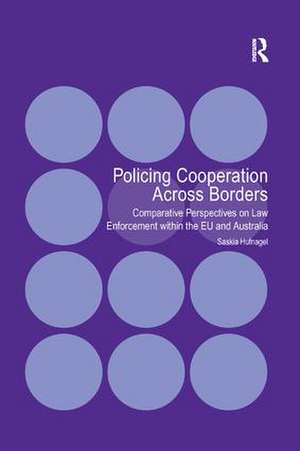Policing Cooperation Across Borders: Comparative Perspectives on Law Enforcement within the EU and Australia
Autor Saskia Hufnagelen Limba Engleză Paperback – 25 noi 2016
| Toate formatele și edițiile | Preț | Express |
|---|---|---|
| Paperback (1) | 469.34 lei 6-8 săpt. | |
| Taylor & Francis – 25 noi 2016 | 469.34 lei 6-8 săpt. | |
| Hardback (1) | 1066.79 lei 6-8 săpt. | |
| Taylor & Francis – 14 ian 2013 | 1066.79 lei 6-8 săpt. |
Preț: 469.34 lei
Nou
Puncte Express: 704
Preț estimativ în valută:
89.82€ • 93.65$ • 74.65£
89.82€ • 93.65$ • 74.65£
Carte tipărită la comandă
Livrare economică 20 martie-03 aprilie
Preluare comenzi: 021 569.72.76
Specificații
ISBN-13: 9781138267121
ISBN-10: 1138267120
Pagini: 356
Dimensiuni: 156 x 234 x 26 mm
Greutate: 0.45 kg
Ediția:1
Editura: Taylor & Francis
Colecția Routledge
Locul publicării:Oxford, United Kingdom
ISBN-10: 1138267120
Pagini: 356
Dimensiuni: 156 x 234 x 26 mm
Greutate: 0.45 kg
Ediția:1
Editura: Taylor & Francis
Colecția Routledge
Locul publicării:Oxford, United Kingdom
Notă biografică
Saskia Hufnagel is a Research Fellow at the ARC Centre of Excellence in Policing and Security (CEPS) and a qualified German legal practitioner and accredited specialist in criminal law. Her research focuses on a variety of socio-legal and security related topics such as comparative criminal and constitutional law, regulation of police cooperation techniques and emergency law. She has published on these and related areas.
Recenzii
'This is a welcome contribution to transnational policing scholarship, introducing comparative 'law in action' studies in the field.' Criminal Law and Criminal Justice Books ’This is a work of great originality:Hufnagel’s monograph analyses with faultless clarity the challenges and practices of cross-border law enforcement cooperation in Australia and the EU - and identifies a range of lessons one system could take from the other. A book of equal interest to academics and senior law enforcement officers and policy-makers.’ Jörg Monar, College of Europe, Belgium ’Written from a comparative socio-legal perspective, this book provides unique insights into law enforcement cooperation in the European Union and Australia, which are borderless societies with remarkable similarities. Containing a wealth of references, it is a must-read for tutors, students and practitioners in the field of security and policing who seek to enrich their academic insight beyond the realms of black-letter law.’ Monica den Boer, University of Amsterdam, The Netherlands 'In a contemporary world in which crime and criminals freely and frequently traverse the borders of nation states the need for effective and sustained international cooperation between law enforcement agencies has never been greater. This excellent book provides a blueprint for such cooperation, based on a rigorous comparative appraisal of collaborative policing in Europe and the Antipodes.' Duncan Chappell, University of Sydney, Australia
Cuprins
1: Police Cooperation and the Law; 2: Historical Evolution of Police Cooperation in the European Union; 3: Historical Evolution of Police Cooperation in Australia; 4: Contrasting ‘Borderless' Societies; 5: Conclusion
Descriere
This book provides new insights into police cooperation from a comparative socio-legal perspective. It presents a broad analysis of comparable police cooperation strategies in two systems: the EU and Australia. Drawing on interviews with practitioners, this book highlights a number of areas where the EU can be compared to a federal system and addresses the advantages and disadvantages of being a Union or a federation of states in relation to police cooperation practice. Particular topics addressed are the evolution of legal frameworks regulating police cooperation, informal cooperation strategies, Joint Investigation Teams, Europol and regional cooperation.
